-
Genealogy & Names
-
Tourist Information
-
Culture & Reference
1798 Rebellion
Dermot, Strongbow and the Invasion of Ireland
The Titanic and Ireland
The Vikings in Ireland
The Ancient Ogham language
Padraig Pearse
Countess Markievicz
Saint Patrick
Saint Brigid
Robert Emmet
Kevin Barry
Michael Collins
Eamon deValera
Sean Lemass
Daniel O'Connell
Charles Stewart Parnell
Wolfe Tone
Brian Boru
Grace O'Malley
James Connolly
Irish Stamps
VALENTINES GIFTS FROM IRELAND - VISIT IrishNation.com Only 32 Days To Go! |

|
IN THIS ISSUE

This month we have another couple of stories of old Ireland and some facts about Dublin city that may surprise you! If you have an article or story you would like to share then please do send it in. Until next time, Michael 
P.S. Please Do Forward this Newsletter to a friend or relative. If you have a website or Facebook page or Blog (or whatever!) then you can help us out by putting a link on it to our website: www.ireland-information.com
|
||||||||||||||||||||||||


find out more |


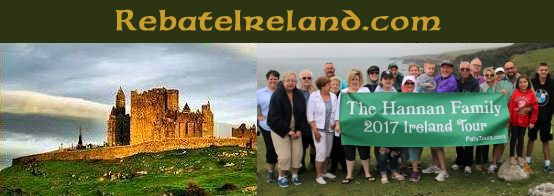
If you are involved in a Non-profit, a Family Gathering, a Church Group, or any kind of organization that has considered Touring Ireland then we can help. Our program allows groups like yours to experience the best of the Emerald Isles at competitive rates. While still being a substantial fundraiser! By participating in our 'Rebate Program' you can get a competitive group tour package and earn between US$4,000 and US$11,000 per group tour. And all without raising the travelerís cost per tour! Interested? Well, It costs nothing to find out more. Visit this web page and complete the simple online form: https://tourismirelandgrouprebateprogram.com Or you can call us direct at +353 76 88 87066 (from USA dial 011-353-76-88-87066) and you can decide if this program is right for you. Please do mention the 'Ireland Newsletter' when you call! |

IRELAND CHANGES CONSTITUTION IN ABORTION REFERENDUM Ireland has voted to change its constitution in what represents the culmination of a decades-long struggle to liberalize one of the strictest abortion regimes in the western world. 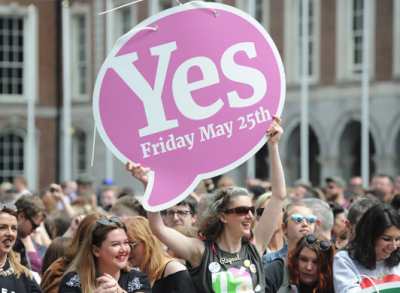 The Eight Amendment to the Irish Constitution severely restricted access to abortion in Ireland and with its repeal the Irish Government is now free to legislate for the provision of abortion services in Ireland and also to remove the possibility of medical practitioners potentially facing criminal charges.
The Eight Amendment to the Irish Constitution severely restricted access to abortion in Ireland and with its repeal the Irish Government is now free to legislate for the provision of abortion services in Ireland and also to remove the possibility of medical practitioners potentially facing criminal charges.
The Referendum campaign was at times bitter and divisive and was projected by opinion polls to be a close-run affair. Distrust of the opinion polls in the wake of the recent US presidential election and the UK Brexit led to those who advocated a 'Yes' vote (those who wanted to repeal the Eight Amendment), not allowing complacency to set in to their campaign. They repeatedly pointed out that this was a 'once in a generation' opportunity to effect real social change in Ireland and hammered home the message that, despite leading in the polls, that their job was not yet done. Their message was heard and the vote was carried by a massive 66.4% to 33.6%. The vote to a large extent mirrors the 2015 Referendum where same-sex marriage was legalized in Ireland by a margin of 61.2% to 37.9%. The conclusions after the 2015 vote are still very relevant in 2018: * Young people participated It is worth noting that at the time that the Eight Amendment was enacted in 1983 citizens who are now 53 years or younger were unable to vote. Primarily it is this precise cohort who have rejected the attitudes of their predecessors with every demographic under the age of 65 emphatically voting 'Yes' while those aged 65 and over were the only demographic to vote 'No'. * New Voters had an impact It is estimated that over 200,000 new voters were registered in the weeks leading up to the vote. This was the third-highest turnout (by percentage) for a Referendum in the history of the country and the biggest turnout ever (by number of voters) in the history of Ireland. * Continuing decline of the Catholic Church in Ireland Church attendance in Ireland has been in steady decline for decades with Archbishop Eamon Martin lamenting the fact that 'Ireland is now conforming to a western liberal democracy... people are taking an a la carte approach to Catholicism.' The Bishop of Elphin responded to the Referendum result by instructing Catholics who voted 'Yes' to attend Confession. Bishop Doran confirmed that those who had erred in favor of repealing the Eight Amendment would be treated the same as 'any other penitent' and that they had sinned by voting 'Yes'. * Those who voted 'No' are still politically unrepresented It is a truism that the older a person becomes the more conservative they become. The truth of this statement is borne out by the results of this Referendum. It is those aged over 65 years who rejected the new proposals and it is still they who are largely unrepresented in a political sense. With all of the major political parties and leaders weighing in behind a 'Yes' vote (Fianna Fail was very divided on the issue), there is no single unifying standard-bearer for the 37.9% who voted 'No'. And those among the younger demographics who voted 'No' are similarly unrepresented. Savita Halappanavar is remembered An RTE survey revealed that as many as 8% of voters were influenced by the tragic death of Savita Halappanavar in 2012. The unnecessary death of this woman in a Galway hospital was the spark that lit the fuse for this social revolution to ignite again. Previous attempts had been made to effect change but there had never been any political will. This time though, the image of Savita Halappanavar proved impossible to ignore for so many voters. UNPAID LEAVE BOOST FOR IRISH PARENTS Big changes are on the way for those parents who wish to take unpaid leave to mind their children. The amount of time that can be taken is to be raised from 4 months to 6 months and the qualifying age of any child from 8 to 12 years. Parents may take this leave without their employment rights being affected. Changes are also on the way to the amount of paid leave parents may take. The new laws were proposed by T.D. Róisín Shortall: 'Increasing the amount of unpaid leave available represents a win-win for both working parents and employees. For parents with pre-school children in particular, unpaid parental leave can be a realistic alternative to paying high costs of formal childcare.' DODGY INSURANCE CLAIMS UNDER THE SPOTLIGHT A spokesman for Insurance Ireland, the representative group for insurers, has suggested that Irish court claims should be benchmarked in the wake of a 10-year study of Irish claims.  The RTE (Irish television) study found that certain Irish counties had a 'claims culture' with Limerick receiving 388 personal industry awards from the PIAB (Personal Injuries Assessment Board) per 10,000 of population compared to Kilkenny which received 122 claim awards per 10,000 citizens.
The RTE (Irish television) study found that certain Irish counties had a 'claims culture' with Limerick receiving 388 personal industry awards from the PIAB (Personal Injuries Assessment Board) per 10,000 of population compared to Kilkenny which received 122 claim awards per 10,000 citizens.
Kevin Thompson of Insurance Ireland: 'There can be no doubt now that the increasing costs of personal injury claims are having severe societal impacts including on individuals, businesses and local authorities.' Mr. Thompson pointed out that a relatively minor finger injury in the UK would receive an average award of 4,700 Euro but in Ireland this could reach 16,600 euro. He said that there is now a need to benchmark Irish personal injury awards to those received in other EU countries. |

FIND YOUR NAME IN OUR GALLERY OF IRISH COATS OF ARMS

|

HOW DID DUBLIN GET ITS NAME? The Gaelic name for Dublin is 'Baile Atha Cliath' which translates literally as 'town of the hurdle ford', a description of the bank of wooden hurdles built up across the river Liffey by the Vikings. 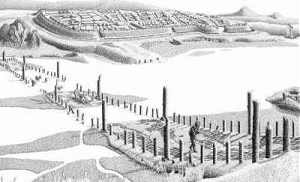 The word 'Dublin' is actually a composition of
two Gaelic words: 'dubh' meaning 'black' and
'linn' means 'pool' (or 'mire'). Thus the
literal translation of the words from which
Dublin gets its name is Black pool!
The word 'Dublin' is actually a composition of
two Gaelic words: 'dubh' meaning 'black' and
'linn' means 'pool' (or 'mire'). Thus the
literal translation of the words from which
Dublin gets its name is Black pool!
Crossing the 'hurdle ford' was not without its dangers. In 770 AD a band of Bon Valley raiders were drowned crossing the Liffey at the hurdle ford. END OF THE VIKINGS IN IRELAND The famous victory by Brian Boru over the Vikings at Clontarf in the year 1014 marked the end of the Viking raids on Ireland. By this time however, the Vikings had already begun to assimilate into, and make their mark on Gaelic society. One such Viking was Sitric Silkenbeard, the King of Dublin. Despite the reputation of the Vikings Silkenbeard was a devout Christian and was responsible for the founding of the famous Christchurch Cathedral at the top of Dame Street in Dublin City Centre. His reign saw the first coins ever minted in Ireland. They bore his image on one side and a cross on the other. He remained in power until 1036 and spent the last of his days on the island of Iona, Scotland. O'CONNELL STREET In 1924 the main street in Dublin City had its name changed from Sackville Street to O'Connell Street, in honour of 'The Liberator'. This change had for long been resisted by the English Vice-Chancellor, Chatterton, who prevented Dublin Corporation from granting the wish of the vast majority of Dubliners. Not to be outdone, the local citizenry opted to use the new name in spite of the lack of official recognition. Dublin Corporation joined into the spirit of things by allowing the 'Sackville' street signs to deteriorate and even threatened to rename a street where prostitutes were known to frequent as 'Chatterton Street'. The creation of the Free State in 1922 finally allowed for the official transformation of Sackville Street into O'Connell Street. KILMAINHAM JAIL Kilmainham Jail near Inchicore in Dublin was originally built on a site known as 'Gallows Hill'. A jail had existed on the site since the year 1210 but was in such neglect that it was demolished and rebuilt in 1796. By the time of the 1798 rebellion the jail was overcrowded but further development did not take place until 1863. Many famous Irish famous historical figures were imprisoned there including Robert Emmett, Charles Stewart Parnell, Padraig Pearse, Countess Markievicz and Eamon DeValera. The prison was closed down in 1924 and is now a museum heritage site, a national monument. THEFT OF THE 'IRISH CROWN JEWELS' The 1907 theft of the 'Irish Crown Jewels' still remains a mystery nearly a century later. The famous regalia of the 'Order of Saint Patrick' were to be placed in a safe in a strongroom in Dublin Castle but, when it was found that the new safe was too large to fit into the strongroom the safe was located in the Library instead. 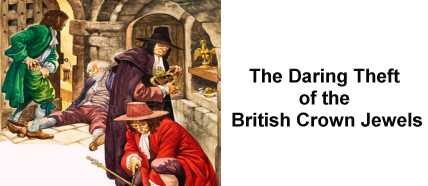
An inspection of the safe in July revealed that the treasure had disappeared. The haul was valued at 30,000 pounds, a huge sum at the time and has never been recovered. DUBLIN AUTHORS The early part of the twentieth century was a magical time for Irish literature. Yeats, O'Casey and Synge were prominent in the famous Abbey Theatre while Dublin provided no less than three Nobel prizewinners. James Joyce was born in Rathgar although there are twenty houses in Dublin city that claim him as an occupant, owing to his family constantly moving about during his early years. His most famous work is Ulysses. Dubliners still celebrate 'Bloomsday' every year, named after his most famous fictional character Leopold Bloom. George Bernard Shaw was another Dubliner who won the famous Novel prize, renowned for 'Pygmalion' on which the movie 'My Fair Lady' is based. Dubliner Samuel Beckett also won a Nobel, and is perhaps most remembered for writing 'Waiting for Godot'. THE ATMOSPHERIC RAILWAY The famous Atmospheric Railway was opened in 1844. The line ran from Dalkey to nearby Kingstown (now Dun Laoghaire) on the southside of the city. This unique system relied on atmospheric pressure to force the railway carriage up the hill to Dalkey and then relied on gravity for the return to Kingstown. A 483 yard pipe ran the length of the track from which air was extracted by a steam-driven pump at the Dalkey end. The resulting vacuum caused a piston to move along the pipe, to which was connected the train. Wax-covered flaps in the pipe opened and closed allowing the piston to move along its length. As the train moved along a wheel pressed down on the pipe sealing in the vacuum as progress was made. Problems with this system meant a man had to follow the train to manually seal the flaps. Momentum from the journey would allow the train to travel the final part of its journey when the pump had been stopped. The piston was then hooked onto the train for the return journey back to Kingstown. If the train stopped short of the station the third-class passengers were required to push the carriage the final part home. Occasionally the train would fly past the Dalkey station and off the tracks at the far end. The system worked well for a decade but was eventually abandoned because of the problems with sealing the vacuum flaps and because of developments with steam-driven engines. The grease and wax that was used on the flaps was also a great attraction for rats who caused repeated damage to the line. The tunnel that was constructed along the line only offered 3 inches of head clearance making it a tricky proposition passengers sticking their heads out of the windows! THE GENERAL POST OFFICE (GPO) The famous General Post Office in Dublin was first opened in 1818. A suggestion that the building be used as a Catholic Cathedral was rejected by the authorities as they did not want a religious institution in such a prominent place in the city. The building was to gain international prominence however, when it was seized during the 'Easter Rising' of 1916. The rebellion, which was led by Padraig Pearse, was very much centered at the GPO which was gutted during the battle that ensued. It was rebuilt during the 1920's but several of the original bullet-holes from the Rising were left untouched, as a reminder of the turbulent history of perhaps the worlds most famous post office. THE BLACKPITS The part of Dublin city just off Clanbrasil Street has for centuries been known as 'The Blackpits'. The origin of this name is unclear. One theory suggests it is so named because of the large number of dead who were placed there during the 'Black Death'. Another suggestion alludes to the black vats used by tanners during the eighteenth century. |

HELP KEEP THIS NEWSLETTER ALIVE!
|
||||

by John B. McCabe I can never recall with any accuracy my first day at school because I made two beginnings. My brother was two years older than me and he was sent to school for the first time at the age of six. I was sent along with him but then my parents took pity on me because I was only four and it was a mile walk to school. I was kept at home until the following year and made a new beginning then. 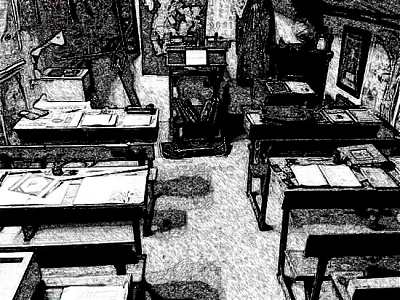 School itself was not such a wonderful experience
though I was bright enough to learn quickly and
was seldom punished. Being naturally fond of
company I delighted in the excitement of the
crowd but privately formed only a few special
friendships.
School itself was not such a wonderful experience
though I was bright enough to learn quickly and
was seldom punished. Being naturally fond of
company I delighted in the excitement of the
crowd but privately formed only a few special
friendships.
In spite of my ability to learn quickly it is sad to recall that I never felt loved at primary school and the prevailing mood of those years was one of anxiety and nervousness ≠ fear of being late, fear of being slapped, shame at watching others being beaten. The schoolmistress who taught me in the early years was a good and conscientious young woman who struggled heroically with too many children clamoring for individual attention. The schoolmaster was humane and philosophical and I warmed to him a little better but never crossed the bridge between servile respect and healthy reverence where real learning is possible. There was a hunger in me that was never filled in those formative years. One or two small seeds did take root where the cadence of words and rhythms from early poems touched my ear for the first time but it was a sparse and famished nourishment that barely awoke the soul. Scientists agree that the most difficult sense to recall is the sense of smell. Even when we dream we do so in visual and aural worlds but never in olfactory dimensions. Yet when it comes to those early school years it is a variety of smells and tactile sensations which best evoke, for me, the ambience and atmosphere of that time. The distinctive smell and cloying touch of plasticine finds me rolling out wriggly worms on a rough bench to form bicycles, bird's nests, little houses and a whole variety of clumsy models of the world around me. The fumbling grip of a tiny finger and thumb on a morsel of chalk - the dry scratching on slate announce my first wobbly alphabet. Cold water, coal dust and sunlight soap in an enamelled basin ≠ the ritual ablutions after lighting the school fire. The aura of expectancy evoked in the smell of new books and their promised discoveries, marred inevitably by ink stains and sullied by punishments earned or undeserved in the explorations of grammar, spelling and transcription. The musty aftermath of stale lunch crumbs in canvas bags - the pungency of ammonia fumes oozing from the dry-toilet walls. These and a thousand other smells are forever remembrances of school. There was no wall-clock that I can recall and the school day was measured as in some primeval age by phases of change. Time did not seem to exist so slowly did the hours drawl by. Morning prayers, roll call, mid-morning break, the shock of sound when the angelus rang from the nearby chapel, lunch-time, afternoon break and finally the excited exodus of home time. These were the constant signposts along to road to knowledge. Between these unchanging divisions of the day lay the timeless routine of learning which followed a monastic regularity: chanting of tables - brow-furrowed puzzlement of sums - the finger leading the eye from word to word along the mysterious page. There was so little colour in those books after we left the infant classes that the mind grew bland with boredom. My eyes hungered for some stimulus to brighten the landscape of our drab and desolate space. I still recall the primitive abacus of coloured spools threaded on clothes-line wire against the brown wainscoted wall - the vivid pink of fresh plaster covering a hole in the off-white ceiling - a deep green spray of painted shamrocks and a cascade of fiery tongues lurking among the dull pages of an early catechism. Occasionally a little light would seep through a chink in the armour of routine. A visiting missionary would call with exotic tales of malarious mosquitoes, witch doctors and cannibals in dugout canoes. For a brief moment our minds would glow in the warmth of imaginations fire, bright as the equatorial sun. Rarer still a travelling conjurer would visit and we could purchase for a few pennies those happy mesmeric moments when 'the swiftness of the hand would steal a march on the eye'. The most terrifyingly important moment of the year was the annual catechism exam when we begged mammy to 'put us over the answers' in the thin dawn light before going in to school. The examiner was a young priest, a gentle, warm and loving man who offered half the answer with the question so that we could act our answers from his prompting phrases while we were centre-stage for this most dramatic performance of the academic year. Progress was measured by postings: firstly from bench to bench and later from room to room. Moving to the 'master's room' marked a definite graduation which promised that sometime in the unimaginable future it might be possible to earn parole from this, to us, life-long learning imprisonment. Then there came a day shortly before I finished my apprenticeship when the master opened a book and read a poem in Irish called 'An Long' ≠ about a ship which came to harbour after many exotic adventures in far-away magical places. That's when it happened. A door opened to a world of words. Was it something in the timbre of emotion in the master's voice or the look of longing in his tired eyes when he savoured the sounds? I am sure he was not aware of the impact he made on me at that moment of epiphany but today I thank him for the gift that was worth the waiting in those timeless years. John B. McCabe |


find out more |

Transformation into wolves is a favourite subject of Irish legend, and, many a wild tale is told by the peasants round the turf fire in the winter nights of strange adventures with wolves. Stories that had come down to them from their forefathers in the old times long ago; for there are no wolves existing now in Ireland. 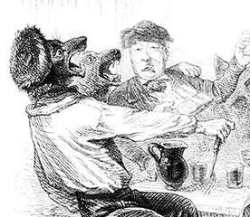 A young farmer, named Connor, once missed two fine cows from his herd, and no tale or tidings could be heard of them anywhere. So he thought he would set out on a search throughout the country; and he took a stout blackthorn stick in his hand, and went his way. All day he travelled miles and miles, but never a sign of the cattle.
A young farmer, named Connor, once missed two fine cows from his herd, and no tale or tidings could be heard of them anywhere. So he thought he would set out on a search throughout the country; and he took a stout blackthorn stick in his hand, and went his way. All day he travelled miles and miles, but never a sign of the cattle.
And the evening began to grow very dark, and he was wearied and hungry, and no place near to rest in; for he was in the midst of a bleak, desolate heath, with never a habitation at all in sight, except a long, low, rude shieling, like the den of a robber or a wild beast. But a gleam of light came from a chink between the boards, and Connor took heart and went up and knocked at the door. It was opened fit once by a tall, thin, grey-haired old man, with keen, dark eyes. 'Come in,' he said, 'you are welcome. We have been waiting for you. This is my wife' and he brought him over to the hearth, where was seated an old, thin, grey woman, with long, sharp teeth and terrible glittering eyes. 'You are welcome' she said. 'We have been waiting for you--it is time for supper. Sit down and eat with us.' Now Connor was a brave fellow, but he was a little dazed at first at the sight of this strange creature. However, as he had his stout stick with him, he thought he could make a fight for his life any way, and, meantime, he would rest and eat, for he was both hungry and weary, and it was now black night, and he would never find his way home even if he tried. So he sat down by the hearth, while the old grey woman stirred the pot on the fire. But Connor felt that she was watching him all the time with her keen, sharp eyes. Then a knock came to the door. And the old man rose up and opened it. When in walked a slender, young black wolf, who immediately went straight across the floor to an inner room, from which in a few moments came forth a dark, slender, handsome youth, who took his place at the table and looked hard at Connor with his glittering eyes. 'You are welcome,' he said, 'we have waited for you.' Before Connor could answer another knock was heard, and in came a second wolf, who passed on to the inner room like the first, and soon after, another dark, handsome youth came out and sat down to supper with them, glaring at Connor with his keen eyes, but said no word. 'These are our Sons,' said the old man, 'tell them what you want, and what brought you here amongst us, for we live alone and don't care to have spies and strangers coming to our place.' Then Connor told his story, how he had lost his two fine cows, and had searched all day and found no trace of them; and he knew nothing of the place he was in, nor of the kindly gentleman who asked him to supper; but if they just told him where to find his cows he would thank them, and make the best of his way home at once. Then they all laughed and looked at each other, and the old hag looked more frightful than ever when she showed her long, sharp teeth. On this, Connor grew angry, for he was hot tempered; and he grasped his blackthorn stick firmly in his hand and stood up, and bade them open the door for him; for he would go his way, since they would give no heed and only mocked him. Then the eldest of the young men stood up. 'Wait,' he said, 'we are fierce and evil, but we never forget a kindness. Do you remember, one day down in the glen you found a poor little wolf in great agony and like to die, because a sharp thorn had pierced his side? And you gently extracted the thorn and gave him a drink, and went your way leaving him in peace and rest?' 'Aye, well do I remember it,' said Connor, 'and how the poor little beast licked my hand in gratitude.' 'Well,' said the young man, 'I am that wolf, and I shall help you if I can, but stay with us to-night and have no fear.' So they sat down again to supper and feasted merrily, and then all fell fast asleep, and Connor knew nothing more till he awoke in the morning and found himself by a large hay-rick in his own field. 'Now surely,' thought he, 'the adventure of last night was riot all a dream, and I shall certainly find my cows when I go home; for that excellent, good young wolf promised his help, and I feel certain he would not deceive me.' But when he arrived home and looked over . the yard and the stable and the field, there was no sign nor sight of the cows. So he grew very sad and dispirited. But just then he espied in the field close by three of the most beautiful strange cows he had ever set eyes on. 'These must have strayed in,' he said, 'from some neighbour's ground' and he took his big stick to drive them out of the gate off the field. But when he reached the gate, there stood a young black wolf watching; and when the cows tried to pass out at the gate he bit at them, and drove them back. Then Connor knew that his friend the wolf had kept his word. So he let the cows go quietly back to the field; and there they remained, and grew to be the finest in the whole country, and their descendants are flourishing to this day, and Connor grew rich and prospered; for a kind deed is never lost, but brings good luck to the doer for evermore, as the old proverb says: 'Blessings are won, By a good deed done.' But never again did Connor find that desolate heath or that lone shieling, though he sought far and wide, to return his thanks, as was due to the friendly wolves; nor did he ever again meet any of the family, though he mourned much whenever a slaughtered wolf was brought into the town for the sake of the reward, fearing his excellent friend might be the victim. At that time the wolves in Ireland had increased to such an extent, owing to the desolation of the country by constant wars, that a reward was offered and a high price paid for every wolf's skin brought into the court of the justiciary; and this was in the time of Queen Elizabeth, when the English troops made ceaseless war against the Irish people, and there were more wolves in Ireland than men; and the dead lay unburied in hundreds on the highways, for there were no hands left to dig them graves. |

|
||||

View the Archive of Irish Phrases here: http://www.ireland-information.com/irishphrases.htm |

The winner was: coffeyannemarie@yahoo.com who will receive the following: A Single Family Crest Print (usually US$24.99) Send us an email to claim your print, and well done! Remember that all subscribers to this newsletter are automatically entered into the competition every time. I hope that you have enjoyed this issue! 
by Michael Green, Editor, The Information about Ireland Site. http://www.ireland-information.com Contact us Google+ (C) Copyright - The Information about Ireland Site, 2018. P.O. Box 9142, Blackrock, County Dublin, Ireland Tel: 353 1 2893860 |

MARVELOUS GIFTS FOR ANY OCCASION FREE DELIVERY TO YOUR DOOR 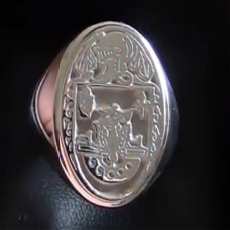
BIG REDUCTIONS! Stunning Family Crest Signet and Seal Rings 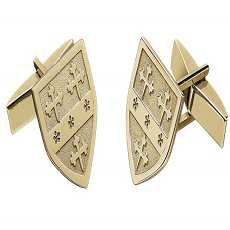
DISCOUNTED FOR A LIMITED TIME Elegant Cufflinks 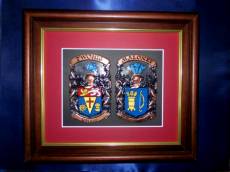
Incredible Family Crest Plaques Made in Ireland 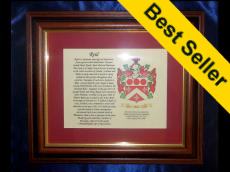
Superior Framed Family Crest Parchments 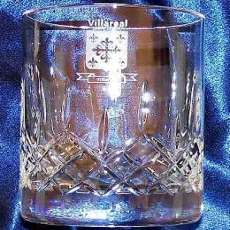
Gorgeous Glistening Galway Crystal 'Your-Name' Old Irish Sign NEW DESIGNS! 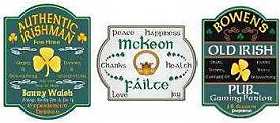
From US$34.99 - Free Delivery 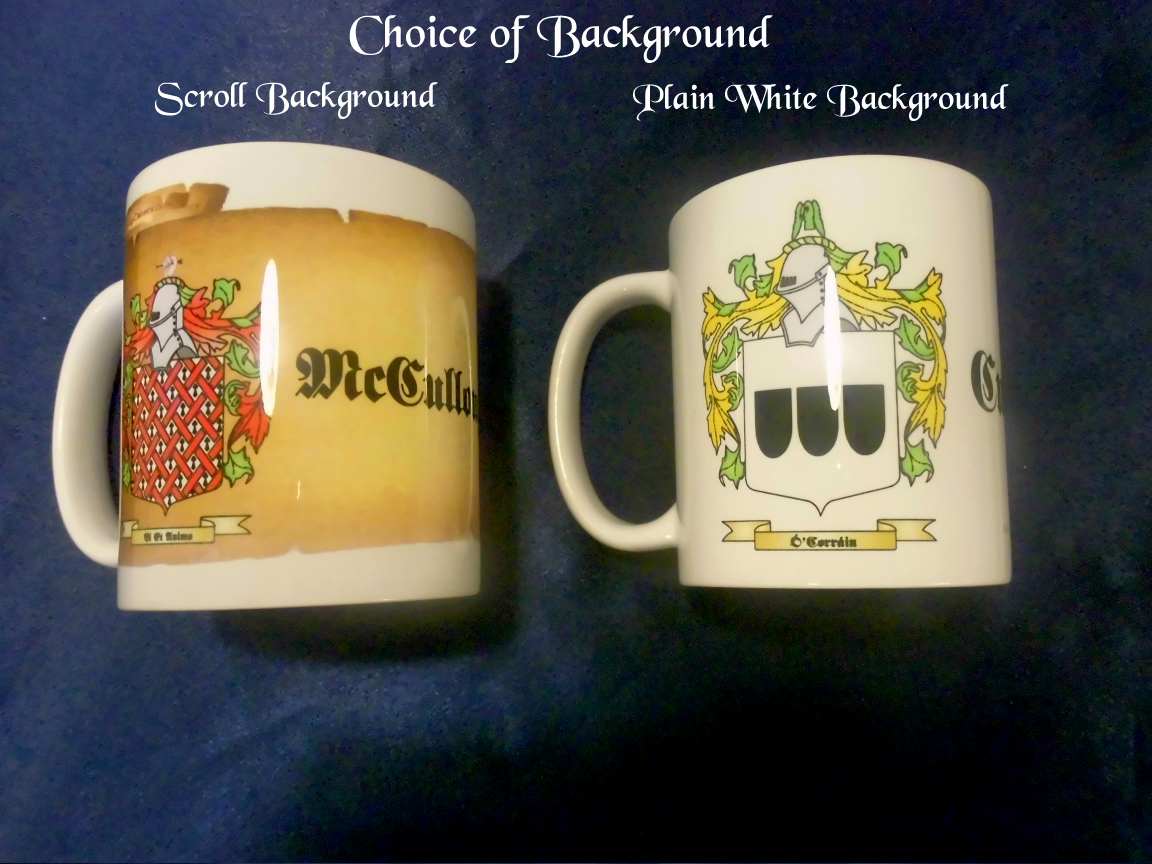
New Designs available on our Coffee Mugs 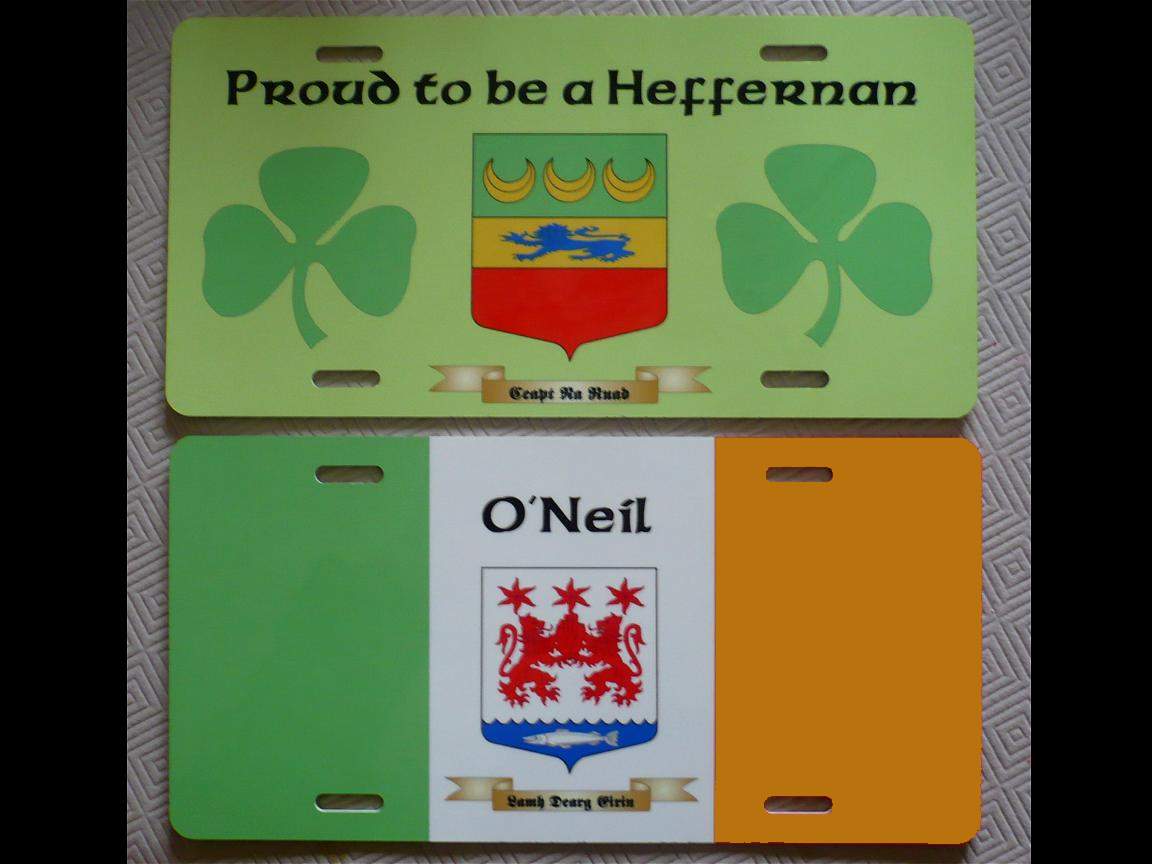
Personalized Licence Plate 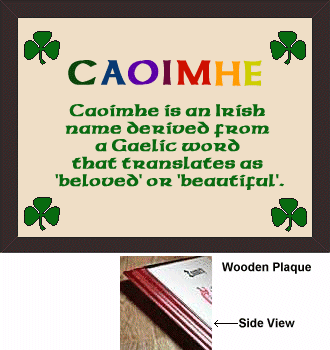
Personalized First Name Plaque. Great for Kids! 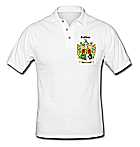
'Your-Name' Polo & Tee Shirts 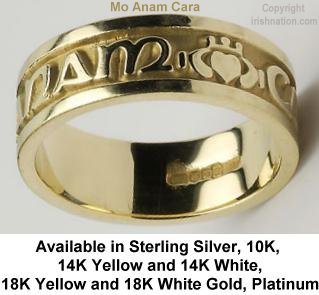
From US$69 Delivered BIG REDUCTIONS! Stunning Engraved Rings from Ireland with Irish Language Phrases. Mo Anam Cara: My Soul Mate Gra Dilseacht Cairdeas: Love, Loyalty, Friendship Gra Go Deo: Love Forever Gra Geal Mo Chroi: Bright Love of my Heart SEE MORE GREAT OFFERS AND DISCOUNTS AT: IRISHNATION.COM FREE DELIVERY FOR A LIMITED TIME! |



